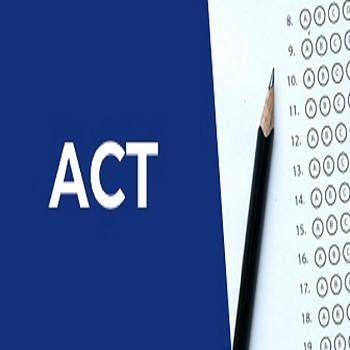ACT Overview:
The ACT is a college entrance exam that many colleges and universities in the United States use as part of the college admissions process. In the ACT, students are assessed in five core areas: English, Math, Reading, Science, and Writing (optional). The validity of ACT scores is five years from the date of testing.
Colleges often use ACT scores for admissions. The reason for this is twofold. It shows how well you’ve prepared for college academically. Additionally, your ACT score will be included in the college’s annual ACT statistics if you are admitted. What are the benefits of increasing your ACT score? Without a doubt. Are you able to improve your ACT score? Without a doubt. The ACT is made up of four sections. These include science, reading comprehension, math, and English.
ACT Exam Format:
The following table gives you a good idea about the flow of the examination on the test day:
| ACT Section | # of Questions | Duration | Syllabus | Question Type |
| English | 75 | 45 minutes | Grammar & usage,/mechanics, and rhetorical skills | Multiple choice |
| Math | 60 | 60 minutes | Algebra, geometry, elementary trigonometry, reasoning, and problem-solving | Multiple choice |
| Reading | 40 | 35 minutes | Reading Comprehension | Multiple choice |
| Science | 40 | 35 minutes | Interpretation, analysis, evaluation, reasoning, and problem-solving | Multiple choice |
| Optional Writing Test | 1 essay prompt | 30 minutes | Writing Skills | Written |
Smart Strategy for the ACT Preparation: Case Study:
- Take a Practice Test: There are a lot of online resources to practice tests or you can go over the Real ACT study guide. Go over all the sample questions and then take the practice test. Solving lots of practice test improve your scores. Math and Science section is more scoring.
- Finding your strong subjects: With the help of practice tests find the vital subject, try to solve more difficult and find out the weak subject, topics and work hard, by solving practice tests and scoring more.
- Setting the ACT targeted composite score: To figure out your ACT target score, look up the score range requirements of colleges.
Usually on average score range requirements of many colleges
are 34-36.
For example:
Assume, you are targeting 34
And your Baseline ACT Composite Score = 32 as per
the mock-up test.
The score difference between a targeted score and a mock-up
test score.
Difference between ACT Composite Score and Baseline
ACT Composite Score ie. 34-32=02
There are some helpful tips and strategies:
- Plan your study time instead of cramming: The ACT tests the knowledge you’ve acquired over the course of your high school career, so cramming is pointless. Tests are designed to measure students’ ability and knowledge during academic sessions.
- Get to know the test: Before your test date, familiarize yourself with the structure of the ACT. Learn and review the directions for each of the sections on the test during your test preparation.
- Attempt easy questions first: First, answer the questions for which you are certain you have the correct answer. Make a mark next to each question you skip in your exam booklet so you can quickly find it later.
- Each question on the ACT has only one correct response: Even if it appears that two correct answers exist, you can only choose one, so choose the best answer for each question.
- Read each question carefully: Never assume you understand a question until you’ve read it from beginning to end. Students will occasionally give an answer they remember from a similar question on a practice test.
- Practice, practice, practice: Let us say it one more time. Practice, practice, practice! There is no substitute for practice.
- Make a timetable: Because there is a time limit for completing the test, do not spend too much time on any one question. Limit yourself to 1–2 minutes for the more difficult questions and no more than 10–20 seconds for the easier ones.
Smart Strategy for ACT preparation:
- Decide the target score goal.
- Take the practice test.
- Find the difference between the Test score and the Targeted score.
- Analyze the practice test.
- Identify the strengths and areas of improvement subject-wise and topic-wise.
- Prepare first high-priority subjects and topics.
- Take practice individual subject tests to check the improvement.
- Take the full-length test before the actual test.
To prepare for the ACT test in a month download the ACT free e-Book. Grade your ACT practice test bubble sheet online to get a detailed Socrato diagnostic report. For a test prep strategy, check out the Socrato Youtube channel.










